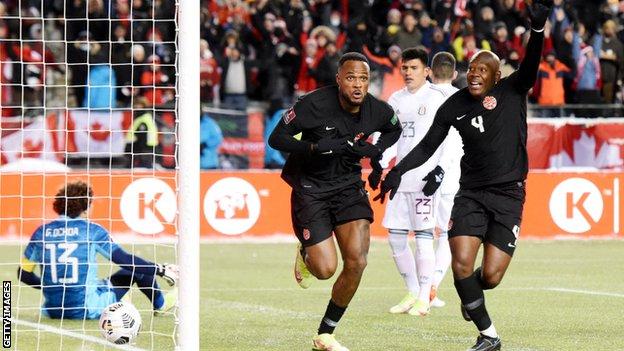In England, memories of the 1986 World Cup centre around Diego Maradona, the ‘Hand of God’ and the wonder goal he scored for Argentina in that quarter-final win en route to lifting the trophy.
Canadian memories of that tournament in Mexico are somewhat different.
Three games, no points, no goals. At least they got there, though.
Until now, 1986 remained the only time Canada had qualified for a World Cup.
That all changed on Sunday, when a 4-0 win over Jamaica booked Canada’s place at the 2022 Fifa World Cup. And it promises to be a golden period for them, since it is anticipated – but not yet confirmed – that their status as co-hosts for the 2026 tournament will bring automatic qualification.
This year’s landmark achievement has come under the guidance of John Herdman, the English coach who led the Canadian women’s team to successive bronze medal Olympic Games finishes in 2012 and 2016.
It is unlikely he will become the first English manager to win the World Cup since Sir Alf Ramsey in 1966, but Canada are upwardly mobile and they will pose a threat in Qatar.
‘All the kids play football, that is the reality’
Alphonso Davies is the poster boy for Canadian football, though Herdman and his team have had to complete qualification without the Bayern Munich defender after he was diagnosed with a heart condition in January.
He is on the road to recovery and will hope to feature at the World Cup, along with the likes of Lille forward Jonathan David and Besiktas frontman Cyle Larin.
Those players are evidence of the growing strength of youth development in Canada – and the wider interest in football in a country that has traditionally focused on more established sports.
“Canada is a hockey nation, but football is the highest participation sport,” said Herdman, speaking to BBC Sport in January.
“All the kids play football, that is the reality. The country has a very diverse demographic. We have a lot of immigrants, including myself, whose first love is football.
“But they have not had a national team to rally around. The women’s team has been uber successful but the men’s team hasn’t broken that threshold.
“It is a sleeping giant. It is ready to put itself into the sporting consciousness of the genuine Canadian sports fan.”
‘A very resilient nation’

Images of Canada celebrating in the snow after their win over Mexico in Edmonton in November were memorable.
Herdman and his staff had already worked out that Concacaf’s gruelling qualification schedule was not set up to help his team.
The conditions play a big factor, with Canada often having to face opponents whose home climate is markedly different to the one Canada’s players are used to.
“In Haiti, in June, it was 37 degrees,” added Herdman. “People’s boots were melting on the rubber on the plastic turf.
“There are moments in those games where the opportunity to check out is there. The ability to say ‘OK, we have an excuse, it is too hot’. The brain is always playing with that.
“It was time for our opponents to get that feeling.”
So the Mexico game was played in Edmonton, where the temperature during the match was recorded at -9C and the snow fell beforehand – lots of it.
“We could have played in a more hospitable climate, maybe even in a closed, indoor stadium, but we were pretty clear this was a new Canada,” said Herdman.
“It is a very resilient nation that has grown up having to play on plastic fields and in cold conditions. We looked at it as an opportunity.
“When people say ‘why haven’t Canada qualified?’ [for so long] you can see the challenges of managing the Concacaf window. Three games in seven days and thousands of miles of travelling to get those games done.”
The chip on the shoulder that drives him on
It is more than 20 years since Herdman, born in Consett in County Durham, left his job at Sunderland’s academy to take over the New Zealand women’s team.
The decision has worked, to the extent that the 46-year-old would be an attractive proposition for a coaching role if he decided to return to his homeland.
It is a conversation he skirts around, secure in the knowledge his contract with the Canadian FA does not expire until after the 2026 World Cup.
“There was a massive motivator at the time, when you haven’t made it as a professional footballer,” he said. “You always have that chip on your shoulder.
“I didn’t play at the highest level and, in my earliest years in coaching, that was relayed to me quite frequently. It develops a mentality of working harder to prove you are at that level.”
Davies’ absence has been felt, but overall, Herdman refers to the 21-year-old as a “generational talent”, capable of transporting Canadian soccer out of a niche environment and into mainstream society.
“He is an influencer, not only through what he has done on the field but through his social media presence,” said Herdman.
“I have an 11-year-old daughter who is obsessed with what he is doing on Tik-Tok. She has never had an interest in soccer all the way through her time in Canada.
“We have a generation of fans for whom this is genuinely new.
“The hardcore fans are there setting the tone but the sports fans are the future now. They are going to fall in love with this sport.”
A version of this article was originally published on 27 January 2022.

